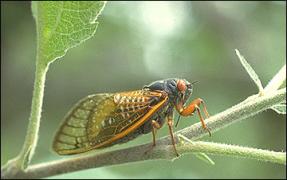Cicada Mania: Will These Bugs Hurt My Pet?

Cicada Mania: Will These Bugs Hurt My Pet?
According to The AMC’s friends at Radiolab, #swarmageddon is upon us. Periodic cicadas, the kind that emerge every 17 years have been spotted in New York, New Jersey, Connecticut and Pennsylvania.
Scientifically, cicadas are hemipterans, but to our pets they may just seem like a tasty snack. Given the average lifespan of dogs and cats, very few of them have previously experienced a cicada swarm, and inquisitive pets may decide to do a taste test of their own.
Essentially, cicadas are harmless. Unlike ticks, they don’t spread disease and unlike fleas, they don’t bite. Timid dogs and cats may be startled by the loud noise made by the male cicada, while playful pets may find these bugs a source of afternoon entertainment.
But what are the potential dangers of eating cicadas? The bugs themselves are not toxic. Think of them as a high protein, low carb, gluten free snack. Small pets with tiny digestive tracts could conceivably have a cicada lodged in their intestine, causing an obstruction. Over indulgence on cicadas in a dog with an indiscriminate appetite (think Labradors) might cause a serious case of upset stomach, but if access to the cicada buffet is restricted, recovery should be uneventful. If the cicadas have been doused with insecticide, they could pose some health risk to your pets. Best to limit cicada consumption, but should your pet snack on a few, I wouldn’t expect any major problems.
Want to learn more about cicadas? National Geographic and Cicadia Mania have great information. Are you hungry for cicadas? Radiolab suggests pairing a Cicada Taco with a Riesling. Have we whet your appetite for cool science? Hear Radiolab conduct an interview at The Animal Medical Center called “Taking the Plunge.”

































